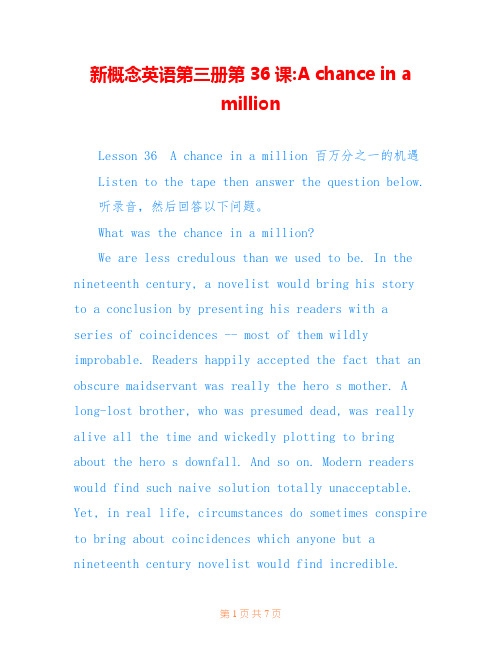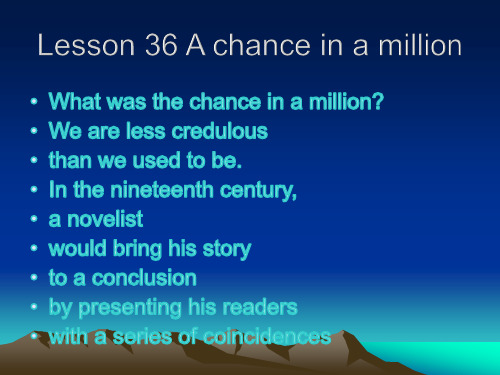新概念三Lesson36课件
- 格式:ppt
- 大小:651.00 KB
- 文档页数:47



新概念英语第三册第36课:A chance in amillionLesson 36 A chance in a million 百万分之一的机遇Listen to the tape then answer the question below.听录音,然后回答以下问题。
What was the chance in a million?We are less credulous than we used to be. In the nineteenth century, a novelist would bring his story to a conclusion by presenting his readers with a series of coincidences -- most of them wildly improbable. Readers happily accepted the fact that an obscure maidservant was really the hero s mother. A long-lost brother, who was presumed dead, was really alive all the time and wickedly plotting to bring about the hero s downfall. And so on. Modern readers would find such naive solution totally unacceptable. Yet, in real life, circumstances do sometimes conspire to bring about coincidences which anyone but a nineteenth century novelist would find incredible.When I was a boy, my grandfather told me how a German taxi driver, Franz Bussman, found a brother who was thought to have been killed twenty years before. While on a walking tour with his wife, he stooped to talk to a workman. After they had gone on, Mrs. Bussman commented on the workman s close resemblance to her husband and even suggested that he might be his brother. Franz poured scorn on the idea, pointing out that his brother had been killed in action during the war. Though Mrs. Busssman fully acquainted with this story, she thought that there was a chance in amillion that she might be right. A few days later, she sent a boy to the workman to ask him if his name was Hans Bussman. Needless to say, the man s name was Hans Bussman and he really was Franz s long-lost brother. When the brothers were reunited, Hans explained how it was that he was still alive. After having been wounded towards the end of the war, he had been sent to hospital and was separated from his unit. The hospital had been bombed and Hans had made his way back into Western Germany on foot. Meanwhile, his unit was lostand all records of him had been destroyed. Hans returned to his family home, but the house had been bombed and no one in the neighbourhood knew what had become of the inhabitants. Assuming that his family had been killed during an air raid, Hans settled down in a village fifty miles away where he had remained ever since.参考译文我们不再像以往那样轻易相信别人了。



§Lesson 36 A chance in a million 百万分之一的机遇【New words and expressions】生词和短语●credulous adj. 轻信的●improbable adj. 不大可能的●obscure adj. 不起眼的●maidservant n. 女仆,女佣●presume v. 假定●wickedly adv. 心眼坏地,居心叵测地●plot v. 密谋●downfall n. 倒台,垮台●naïve adj. 天真的●unacceptable adj. 不能接受的●conspire v. (事件)巧合促成●incredible adj. 难以置信的●resemblance n. 相似●scorn n. 嘲弄,挖苦●acquaint v. 使了解●reunite v. 使团聚●assume v. 假定,认为L35-05_36-01 end 9’34”L36-02 begin 9’32”■credulous adj. 轻信的(修饰人)credible: 可信的,可靠的(修饰事物)Eg: The story he told us is credible.incredulousincrediblebelievableEg; He demanded for believable explanationunbelievable■improbable adj. 不大可能的■obscure adj. 不起眼的Eg: The bus stopped at an obscure little town令人费解的An obscure figure can be seen through the fog.vague 多用于比喻意,指不明确说明而造成的模糊不清■maidservant n. 女仆,女佣■presume v. 假定vt.presume thatpresume: 假定(根据过去的经验和感觉作出决断)assume : 武断的,把尚未证实的作为依据,与事实不相符合Eg: Let us assume that your words are factsuppose : 最普通的用词,猜想、陈述自己的看法Eg: I suppose that it was my fault.■wickedly adv. 心眼坏地,居心叵测地■plot v. 密谋The criminals were plotting to rob the bank.conspire: 众多人合谋做重大的犯法勾当,犹指反叛,不用于修饰单个人scheme: 某人暗中设计狡诈的手段来谋求自己的私利The man is scheme for power.■downfall n. 倒台,垮台■naïve adj. 天真的■unacceptable adj. 不能接受的■conspire v. (事件)巧合促成vi.The weather and car trouble conspire to spoil our vacation.■incredible adj. 难以置信的■resemblance n. 相似likeness: 最普通的用语,比resemblance意味要强bear a strong resemblance to sb. or sth.The girl bears a strong resemblance to her sister.such a resemblanceresemble 特别是指外观或外在性质的相似similarity:性质、特色、程度的相似The two envents which happened at the same time have got similarity similar to sth. or sb.They have got close likeness.L36-02 end 9’32”L36-03 begin 9’14”■scorn n. 嘲弄,挖苦pour scorn onpour contempt onpour ridicule on 对……嘲弄,挖苦,斥之以鼻pour heapEg: He poured scorn on his wife’s suggestion.look down upon / think scorn of 藐视contempt: 蔑视,强烈谴责某人或某事低贱、卑鄙,语气强于scorndespite: 语气较弱,表示嘲弄Eg: His suggestion was dismissed with scorn.His face showed the scorn he felt.■acquaint v. 使了解be acquainted with sth. 对……有所了解acquaint sb. with sth. / acquaint sb. of sth. 告之某人某事make a person acquainted with sb. 介绍某人同另一个人认识Let me make ... acquainted with you (正式用法)acquaintance n. 熟人■reunite v. 使团聚■assume v. 假定,认为【Text】§Lesson 36 A chance in a million 百万分之一的机遇Listen to the tape then answer the question below.What was the chance in a million?We are less credulous than we used to be. In the nineteenth century,a novelist would bring his story to a conclusion by presenting hisreaders with a series of coincidences ---- most of them wildlyimprobable. Readers happily accepted the fact that an obscuremaidservant was really the hero's mother. A long-lost brother, whowas presumed dead, was really alive all the time and wickedlyplotting to bring about the hero's downfall. And so on. Modern readers would find such naive solutions totally unacceptable. Yet, in real life, circumstances do sometimes conspire to bring about coincidences which anyone but a nineteenth century novelist would find incredible.When I was a boy, my grandfather told me how a German taxi driver, Franz Bussman, found a brother who was thought to have been killed twenty years before. While on a walking tour with his wife, he stopped to talk to a workman. After they had gone on, Mrs Bussman commented on the workman's close resemblance to her husband and even suggested that he might be his brother. Franz poured scorn on the idea, pointing out that his brother had been killed in action during the war. Though Mrs Bussman was fully acquainted with this story, shethought that there was a chance in a million that she might be right. A few days later, she sent a boy to the workman to ask him if his name was Hans Bussman, Needless to say, the man's name was Hans Bussman and he really was Franz's long-lost brother. When the brothers were reunited, Hans explained how it was that he was still alive. After having been wounded towards the end of the war, he had been sent to hospital and was separated from his unit. Thehospital had been bombed and Hans had made his way back into Western Germany on foot. Meanwhile, his unit was lost and all records of him had been destroyed. Hans returned to his family home, but the house had been bombed and no one in the neighbourhood knew what had become of the inhabitants. Assuming that his family had been killed during an air raid,Hans settled down in a village fifty miles away where he had remained ever since.参考译文我们不再像以往那样轻易相信别人了。
新概念英语第三册的课文(36)We are less credulous than we used to be. In the nineteenth century, a novelist would bring his story to a conclusion by presenting his readers with a series of coincidences -- most of them wildly improbable. Readers happily accepted the fact that an obscure maidservant was really the hero's mother. A long-lost brother, who was presumed dead, was really alive all the time and wickedly plotting to bring about the hero's downfall. And so on. Modern readers would find such naive solution totally unacceptable. Yet, in real life, circumstances do sometimes conspire to bring about coincidences which anyone but a nineteenth century novelist would find incredible.When I was a boy, my grandfather told me how a German taxi driver, Franz Bussman, found a brother who was thought to have been killed twenty years before. While on a walking tour with his wife, he stooped to talk to a workman. After they had gone on, Mrs. Bussman commented on the workman's close resemblance to her husband and even suggested that he might be his brother. Franz poured scorn on the idea, pointing out that his brother had been killed in action during the war. Though Mrs. Busssman fully acquainted with this story, she thought that there was a chance in a million that she might be right. A few days later, she sent a boy to the workman to ask him if his name was Hans Bussman. Needless to say, the man's name was Hans Bussman and he really was Franz's long-lost brother. When the brothers were reunited, Hans explained how it was that he was still alive. After having been wounded towards the end of the war, he had been sent to hospital and was separated from his unit. The hospital had been bombed and Hans had made his way back intoWestern Germany on foot. Meanwhile, his unit was lost and all records of him had been destroyed. Hans returned to his family home, but the house had been bombed and no one in the neighbourhood knew what had become of the inhabitants. Assuming that his family had been killed during an air raid, Hans settled down in a village fifty miles away where he had remained ever since.New words and expressions 生词和短语credulousadj. 轻信的improbableadj. 不大可能的obscureadj. 不起眼的maidservantn. 女仆,女佣presumev. 假定wickedlyadv. 心眼坏地,居心叵测地plotv. 密谋downfalln. 倒台,垮台naiveadj. 天真的unacceptable adj. 不能接受的conspirev. (事件)巧合促成incredibleadj. 难以置信的scornn. 嘲弄,挖苦acquaintv. 使了解reunitev. 使团聚assumev. 假定,认为参考译文我们不再像以往那样轻易相信别人了。